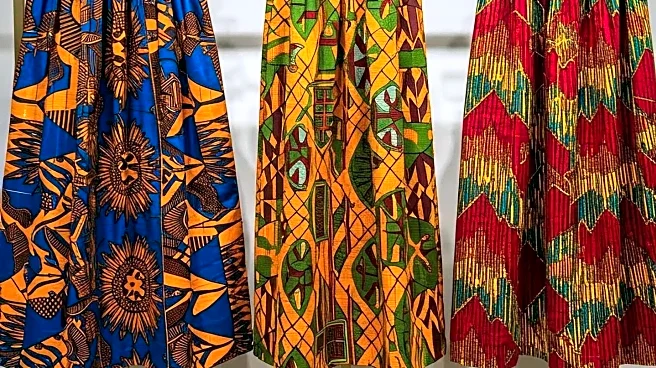What is the story about?
What's Happening?
Italian-Haitian designer Stella Jean made a notable return to the Milan runway after a three-year hiatus, showcasing a collection crafted with Bhutanese artisans. Her latest collection, presented during Milan Fashion Week, emphasized the importance of preserving traditional craftsmanship, which she believes is vital to the luxury fashion industry. Jean has consistently integrated global artisan work into her designs, combining Italian tailoring with textiles and artistic details sourced from traditional artisans. She expressed concern over the decline of Italian craftsmanship, noting that fewer young people are entering these trades. To address this issue, Jean called for Italian lawmakers to extend fiscal breaks to fine craftsmanship, similar to those given to artworks, to encourage investment in artisan-made pieces. Her runway show featured traditional Bhutanese garments, such as the kira, and highlighted the artisans she collaborated with, who were seated in the front row.
Why It's Important?
Stella Jean's advocacy for artisan craftsmanship highlights a critical issue in the fashion industry: the potential loss of traditional skills and cultural heritage. By calling for fiscal incentives, Jean aims to make artisan-crafted pieces more accessible to consumers, ensuring that artisans receive fair compensation. This move could help sustain the livelihoods of artisans and preserve cultural heritage, which is at risk of being relegated to museums if not actively worn and appreciated. The fashion industry, particularly luxury brands, stands to benefit from this preservation, as it maintains the unique edge that handcrafted pieces provide. Additionally, Jean's efforts could inspire other designers and lawmakers to prioritize the protection of traditional craftsmanship, fostering a more sustainable and culturally rich fashion landscape.
What's Next?
If Italian lawmakers respond to Stella Jean's appeal, there could be significant changes in the fiscal policies affecting the fashion industry. Such changes might lead to increased investment in artisan-crafted pieces, providing a boost to the traditional craftsmanship sector. Designers and fashion houses may begin to incorporate more artisan work into their collections, potentially leading to a resurgence of interest in traditional techniques. Furthermore, Jean's initiative could spark broader discussions on the importance of cultural preservation in fashion, encouraging collaborations between designers and artisans worldwide. The outcome of this advocacy could set a precedent for other countries to follow, promoting global efforts to sustain traditional craftsmanship.
Beyond the Headlines
Stella Jean's runway show not only showcased fashion but also served as a platform for cultural exchange and appreciation. By collaborating with Bhutanese artisans, Jean highlighted the interconnectedness of global cultures and the shared responsibility to preserve them. This approach underscores the ethical dimension of fashion, where designers are encouraged to consider the cultural impact of their work. Jean's initiative may lead to increased awareness and appreciation of diverse cultural traditions, fostering a more inclusive and respectful fashion industry. Additionally, her efforts could inspire consumers to value the stories and heritage behind the garments they wear, promoting a shift towards more mindful consumption.

















